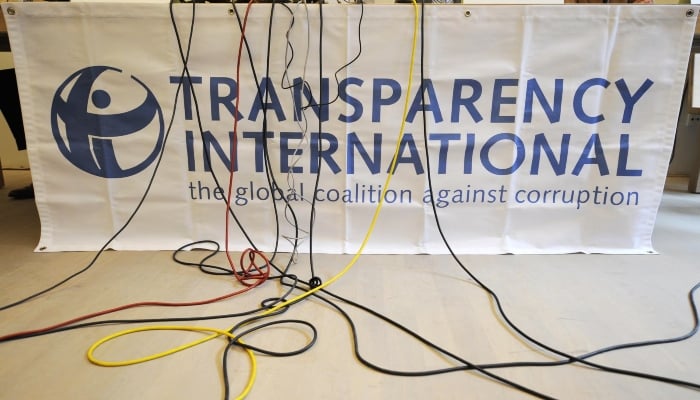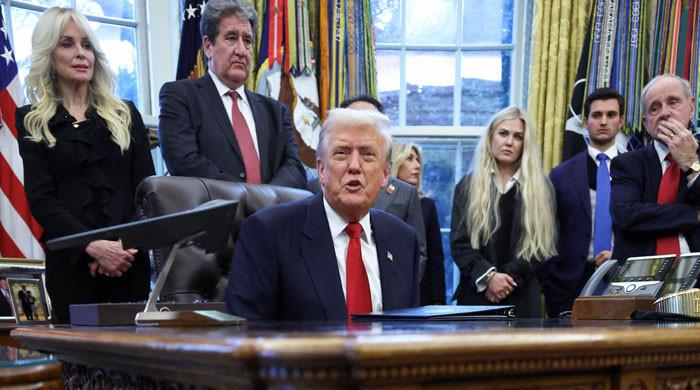Transparency International report suggests key structural reforms
Report is prepared by Dr Kaiser Bengali, Kashif Ali, Shamail Adnan Khan and Ms Raima Mehmood
June 05, 2025

ISLAMABAD: Transparency International (TI) Pakistan has submitted a comprehensive 67-page Civil Society Governance Diagnostic Assessment (GDA) Report 2025 to the International Monetary Fund (IMF) and the Government of Pakistan, evaluating the country’s governance and anti-corruption landscape while proposing reforms crucial for economic growth.
The report presents wide-ranging recommendations to address structural weaknesses in fiscal governance, public sector accountability and economic regulation.
Key proposals include the removal of ‘tax shelters’ for the agriculture sector and introducing the same tax bars for all taxpayers, empowering parliamentary standing committees in the budget vetting process, empowering Senate to scrutinise and vote on money bills, introduction of “right to first purchase” rule to address grey areas in real estate sector, decentralisation of all federal agencies affected by 18th Amendment, restructuring BISP, introducing oversight mechanism for NAB and other anti-corruption agencies, optimising the governance of state-owned enterprises, breaking the cycle of undocumented economy, adopting Whistleblower Protection Legislation, enacting comprehensive Conflict of Interest (COI) Regulations for Public Officials and promoting transparency through Right to Information.
The report is prepared by Dr Kaiser Bengali, Kashif Ali, Shamail Adnan Khan and Ms Raima Mehmood.
According to the report, Pakistan is currently engaged with the IMF through a 37-month Extended Fund Facility (EFF) worth $7 billion. This programme is designed to support structural reforms aimed at restoring macroeconomic stability, addressing fiscal and external imbalances, and ensuring long-term economic sustainability.
Core priorities under the EFF include fiscal adjustment, improving debt dynamics, achieving exchange rate flexibility, expanding the tax base and reforming state-owned enterprises (SOEs). These reforms are essential for avoiding a cycle of repeated bailouts and placing the economy on a more resilient footing.
The report, it is said, provides an independent, evidence-based contribution grounded in the realities of Pakistan’s governance challenges to the federal and provincial governments, as well as contributes to the ongoing governance and anti-corruption diagnostic assessment being undertaken by the IMF at the request of the Government of Pakistan.
“This report is the result of extensive national consultations, key informant interviews and focus group discussions with stakeholders from civil society, academia, the private sector, and legal and financial experts. It explores structural impediments to reform, exposes institutional gaps and offers practical recommendations to improve fiscal governance, financial transparency, public sector efficiency and rule of law.”
The recommendations of the report include:
- Strengthen the role of parliament in the budget process by empowering parliamentary standing committees in the budget vetting process.
- Extend the power of the Senate to scrutinise and vote on money bills to enhance provincial say in the allocation of national resources.
- Remove the undue advantage of ‘tax shelters’ from the agriculture sector and ensure that all sectors face the same tax bars.
- Implement the principle of ‘Right of First Purchase’ to reduce grey areas in real estate, ensuring that all property transactions negotiated between two parties – seller and buyer – are uploaded on the FBR website, detailing the property characteristics and agreed price to enable a 3rd party to bid higher for the same property.
- Upload summaries of all Letters of Credit (L/C), specifying the product(s) and f.o.b. price, on the dedicated Customs Department website to enable a 3rd party to bid for the same at a higher price to address under-invoicing in imports.
- The divisions, and associated departments, autonomous and semi-autonomous agencies, related to subjects that have been devolved to the provinces vide the 18th Constitutional Amendment must be decentralised.
- Improving Benazir Income Support Program (BISP) effectiveness via administrative restructuring. BISP shall adopt lean management practices to streamline its administrative structure by leveraging its extensive automation.
- Optimising governance and operations of state-owned enterprises.
- Prioritise the Public Private Partnership (PPP) approach: privatise management, not assets. Where assets are privatised, exclude land which must remain with the government to prevent conversion to non-industrial uses.
- - Ensure that there is no Conflict of Interest (COI) in the composition of SOEs boards between board members and public and private entities.
- Parliamentary oversight and Public Accounts Committee. Introduce a binding legal provision mandating the appointment of the Leader of the Opposition as PAC Chair at both national and provincial PACs to institutionalise impartial parliamentary oversight.
- Establish statutory timelines and ensure adequate resourcing for Public Accounts Committees (PACs) to complete and submit audit reports within two years of the fiscal year’s end.
- Parliamentary disclosures under the Fiscal Responsibility and Debt Limitation (FRDL) Act 2005 including debt status must be published online.
Enhancing state capacity through public sector digitisation.
- The government must publish a 5-year plan for digitisation of public service delivery, providing a roadmap to automate processes for essential public services, minimising discretionary powers and abuse of authority.
- Strengthening business registration and documentation systems.
- Implement a fully digitised business registration system, reducing human interaction to break the cycle of the undocumented economy.
- Make a concerted effort, through the State Bank of Pakistan, to increase the electronic financial transaction footprint by instituting incentives for ‘sellers’ and ‘buyers’. This can be achieved by providing cash back to both parties equal to, say, one per cent of the total transaction value over the period of one year.
- - Promoting private sector development through investment facilitation.
- All tax-related decisions, including court decisions and notifications (SROs, office orders, file notes, etc.) regarding tax and administrative changes must be uploaded to the FBR website to avoid arbitrariness in interpretation.
- All matters related to taxes must be automated end to end, with explanatory notes in simplified language to ensure easy comprehension.
- Monetary, fiscal and administrative incentives and supports, offered at the time the investment decision is made, are not altered mid-stream.
- Mandate a centralised, public, and verified beneficial ownership registry.
- xMandatory publication of the Tax Directory of public officials (drawing remuneration from the public exchequer) within six months of the close of the tax year.
- A lean anti-corruption agency with an oversight committee should be formulated for NAB’s accountability.
- NAB should make a thorough analysis of the entire chain of the system to improve its conviction rate. The timeline to dispose of a corruption case must not exceed 30 days. At least 20 per cent of the budgetary allocation of NAB, FIA, and provincial anti-corruption establishments must be dedicated to prevention and awareness.
- NAB should ensure that the reference prepared and successfully tried in the accountability courts should be upheld in all subsequent review petitions in the High Courts and Supreme Court.
- Strengthen the institutional capacity, independence, and resourcing of provincial anti-corruption establishments.
- Mandating regular publication of the United Nations Convention against Corruption (UNCAC) UNCAC Country Report.
- Integrate anti-corruption and civic education in the curriculum of the elementary, secondary and degree programs of educational institutions.
- Adopt a robust and comprehensive Whistleblower Protection Legislation.
- Enact comprehensive Conflict of Interest (COI) Regulations for Public Officials.
- Promoting transparency through the Right to Information.
- Strengthen implementation of RTI Laws across all jurisdictions including adoption of RTI law in Gilgit Baltistan (GB) and Azad Jammu and Kashmir (AJK) through enforcement and digitisation.
- Enhance public awareness, accessibility and utilisation of Right to Information (RTI) laws and procedures.
- Establish a systematic cabinet decision publication mechanism for public disclosure of key decisions.
- Improving the Composition of Information Commissions by ensuring gender parity and timely appointments in Information Commissions.
- Publish quarterly reports of public bodies highlighting data on information requests, appeals/complaints, penalties and performance of public bodies.
- Reforming procurement systems for greater fiscal transparency.
- To ensure the full efficacy of the e-procurement system, a fully digitised evaluation procedure as well as a digitised complaint handling process, without the involvement of department officials, must be ensured.
- Amend PPRA Rule 38B to ban single tendering.
- Address conflict of interest in the composition of the PPRA Board.
- Strengthening local governance for responsive service delivery.
- Addition of a dedicated chapter on local government, outlining the institutional structure, power, functions, tenure and list of jurisdiction over local subjects, along the lines of the existing chapters on federal and provincial governments.
- Institute Provincial Finance Commission (PFC) along the lines of the National Finance Commission (NFC) to determine the distribution of provincial fiscal resources between the province and local entities and among local entities.
- Climate governance integrity key recommendations: Implement a centralised climate finance tracking system to monitor and report on the allocation and use of climate funds.
Build the technical and operational capacity of climate governance institutions at both the national and provincial levels to improve policy implementation. Introduce robust procurement procedures for climate-related projects to minimise corruption risks and ensure value for money.
Strengthen the Auditor General of Pakistan (AGP) and other audit bodies to conduct thorough and timely performance audits of climate-related projects. Provide anti-corruption agencies with the necessary resources, autonomy, and expertise to investigate and address corruption in climate finance.
Establish a specialised environmental court to adjudicate climate finance cases and enhance the judicial capacity to handle climate-related issues. Establish a comprehensive legal and regulatory framework for carbon markets to ensure credibility and attract international investment.
Originally published in The News












